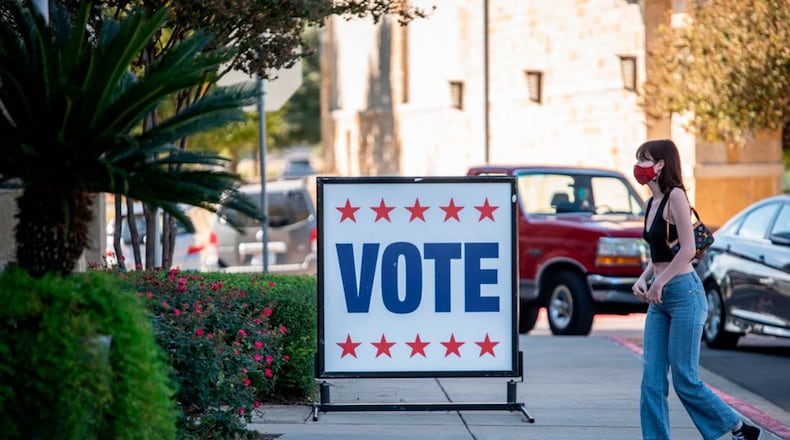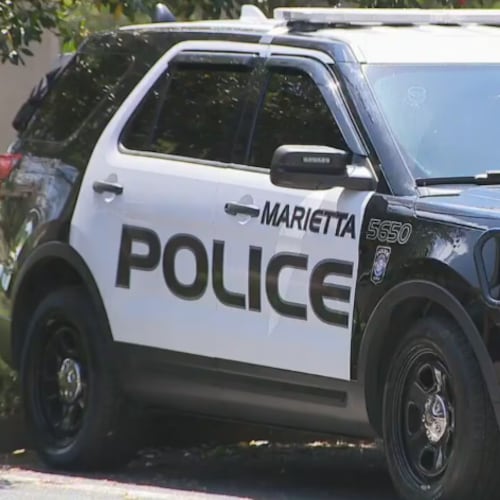Katy Harvey, 19, remembers the day she first felt called to politics. She was 14.
“It was weird that day. I walked into school that day, I could tell things were off. People crying about election results,” Harvey said about the day after the 2016 presidential election. She watched reports of the results in her high school’s auditorium in Johns Creek.
Since then, Harvey has cast her ballot in every election she has been eligible to vote in. She also participated in the Women’s March on Washington in 2017, and in several other political marches in Atlanta.
Young people in metro Atlanta are politically active and informed, despite historically low voter turnout in elections, experts say.
The Atlanta Journal-Constitution interviewed more than a dozen voters under age 31, who said they have voted in recent elections and plan to vote in future elections.
Many said they developed a greater interest in politics following that election, with many of these younger voters citing former President Donald Trump’s rhetoric as a reason why they decided to get more involved in politics.
All of the young voters interviewed said they use social media to speak out on political topics or have friends who do. It is their primary source for news and information, they said.
Young voters continue to have lower turnout in elections than older age groups, as only 52% of 18-34 year-old segment of registered voters said they were “extremely motivated to vote,” according to a study by Pew Research in 2020. In the same survey, 74 percent of voters ages 50-64 said they were “extremely motivated to vote.”
In Fulton County, about 43% of registered voters 18-24 cast a ballot in the Jan. 5 runoff election, according to the Georgia Secretary of State’s Office. In Gwinnett County, 47.5% of young people voted, and in Cobb that number was nearly 50%. In DeKalb County, just under 50% of young registered voters participated in the election.
However, Emory University Political Science Professor Bernard Fraga does not think that young voters’ low motivation to vote is necessarily a measure of political engagement.
“That doesn’t necessarily mean that young people are not engaged,” said Fraga. “It means that some of the features of the electoral system, the need to be registered, the fact that you have to update your registration when you move, ID requirements, etc., that means that for many young people, voting is a significant burden.”
Patrick Pilkey, 29, teaches high school photography at a private school in North Atlanta. He said his students engage in politics every day.
“They’re just so plugged in from an early age, that they really have a good grasp on a lot of topics,” Pilkey said. “They’ll speak to their friends and they’ll get a variety of opinions. And I think that they are more informed than we give them credit for.”
Harvey agrees. “We definitely have more resources than other generations to learn, and more opportunities to hear from people who have been directly impacted,” she said.
‘Our activism can be seen’
Angelica Nguyen, 20, said that she uses social media to spread information about protests and how to vote in elections.
“That’s pretty important because I guess most people do get most of their information from social media these days,” she said.
Hannah Johns-Holland has voted in every election since she was eligible to vote and plans to vote in upcoming local elections in 2021. She also frequently uses social media to call attention to causes she cares about.
“I don’t think we’re given enough credit for being politically aware,” Johns-Holland said. “Our activism can be seen, but a lot of people don’t realize what we know.”
Social media is also a useful tool for teenagers who want to be involved in politics but are not old enough to vote.
“I wish I could do more, but I post a lot of stuff on my [Instagram] stories,” said Matera Chasteen, 16, of Marietta. “I try to repost stuff that I find important.”
Avery Green, 21, is a student at Kennesaw State University and he said politics are frequently discussed in his group of friends.
“I’ve been able to talk about politics with people on both sides of the parties, and at the end of the day, we are still friends and are more than just our opinions,” Green said.
Although young voters use social media as a way to engage in political discussions, it can also create a pressure for young voters to speak out on every issue.
“I feel like everything is political at this point. Every time I get on [social media], I get hit in the face with a lot of political stuff,” Nina Servio, 20, said. She said she occasionally posts, but often tries to keep her opinions to herself to avoid getting caught in the storm of negative comments. Servio said she feels conflicted about social media activism.
“It feels like the right thing to do, but it also feels like it doesn’t do anything,” she said.
Servio said that social media has become a “performative activist outlet” for many of her peers, and she does not see their activism translate into real-life action. Voting is important to Servio, and she said she plans to vote in November.
Green also feels the peer pressure associated with social media.
“I definitely feel on social media, if you don’t post on something, you’re pressured into it,” Green said, citing the recent Israel-Palestine conflict as a subject he felt pressured to post on.
“It was a challenge not to pick a side,” said Green, who is Jewish. He said he noticed that many of the Jewish creators he follows on social media were asked to give opinions on the conflict and violence, even if they were not political content creators.
Those creators post primarily about politics on social media accounts, like TikTok, Twitch, Instagram, or Twitter.
According to Fraga, there is an explanation for this pressure.
“Many people feel alienated from politics, feel like politicians aren’t really interested in addressing the major issues that young people, older people as well, really care about,” Fraga said. “I think it puts pressure on ordinary citizens to try and make a difference on their own.”
Another downside of increased activism on social media is the potential for sharing false information, Fraga said.
“We saw an extensive effort using social media platforms, including WhatsApp, to reach out to - especially Latino voters, but also young African American voters - with messages that objectively would be defined as misinformation regarding COVID, regarding Black Lives Matter, regarding social movements, and regarding the stances that Trump and Biden were taking,” he said. “That’s a troubling trend in many ways.”
About the Author
Keep Reading
The Latest
Featured



